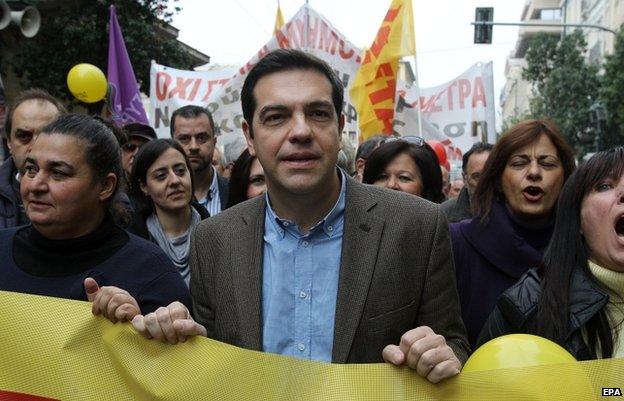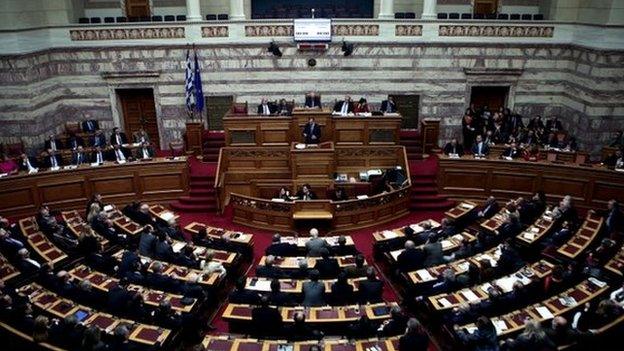Greek radical left Syriza prepares for power under Tsipras
- Published

Alexis Tsipras has warned the markets they will have to "dance to the tune" of a Syriza government
A large portrait of Marxist revolutionary Rosa Luxemburg hangs in the Thessaloniki office of Nikos Samanidis, a founder member of Greece's Coalition of the Radical Left, better known as Syriza.
With many Greeks exhausted by five years of recession, tax hikes and record unemployment rates, Syriza and its firebrand leader Alexis Tsipras are tipped to win the early elections that must be called, according to the Greek constitution, if parliament fails to elect a new head of state by 29 December.
"After decades on the defensive, the left is staging a comeback. Not just in Greece, but in Europe and Latin America as well," said Mr Samanidis, a top official of Syriza in the country's second city.
Alluring as it may prove to Greek voters, the prospect of a leftist party coming to power in Europe's most indebted country is rattling the markets and European capitals.
Greek Prime Minister Antonis Samaras has warned parliamentarians that if they fail to elect a new president, Greece could risk a disastrous exit from the eurozone.
.jpg)
Syriza won the European elections in Greece in May and are still leading in the opinion polls
The Athens Stock Exchange posted its biggest drop on record on 9 December, while borrowing costs for Greece have skyrocketed amid the political uncertainty.
A number of senior European officials have urged voters to support the ruling coalition of conservatives and social democrats. "I wouldn't like extreme forces to come to power. I would prefer if known faces show up," European Commission President Jean-Claude Juncker recently told journalists, commenting on the chances of a general election in Greece.
'Still radical'
While Rosa Luxemburg may adorn its offices, Syriza is not the revolutionary force that her Spartacists represented in Germany a century ago.
As the party draws closer to real power, it has softened many of its sharp edges and tried to build bridges, even with City hedge funds. Syriza is vowing to keep Greece within the eurozone and has reassured creditors it will refrain from unilateral decisions on the debt issue.

A portrait of Marxist revolutionary Rosa Luxemburg in Nikos Samanidis' office indicates Syriza's political leanings
Far from being destructive, Syriza's political proposals offer a reasonable way out of austerity and a chance to replace existing bailout laws with new ones, argues political economist Yanis Varoufakis.
"The first priority is renegotiating with creditors. Syriza needs to speak the language of truth about the continuing triple bankruptcy of the country - public debt, banks, private sector - something no Greek government has done so far. Then they need to table positions that the average German will find reasonable."
But Syriza and its 40-year-old leader are still seen by many in the Greek and European establishment as unknown and potentially dangerous quantities.
Mr Tsipras has warned markets that they "will have to dance to the tune" of his government, while Syriza promises to boost public spending, reverse privatisations, increase salaries and pensions and repeal bailout laws liberalising the markets.
Nikos Samanidis emphasises that the prospect of power has not blunted the radical nature of the party, despite its meteoric rise from relative obscurity to frontrunner in little over two years.
"The rich, the elites, the markets, the super-rich, the top 10%, yes, they obviously do have reason to worry," he says.
"They will lose their privileges. Our voter base has expanded greatly, but the grassroots, radical nature of Syriza has been preserved thanks to the crisis. Our party has not and will not sever its ties with the streets, with the social movements it arose from."
Syriza was formed in 2004 as a coalition of groups and parties ranging from Maoists to greens. Before 2012 its electoral appeal had been of little consequence for Greece's political system, never exceeding 5% of the vote. It only became a unitary party in 2013.
But in 2012, in the apogee of the Greek crisis, Syriza took the political establishment by storm, polling close to 27% in the June general elections and eclipsing the social democrats to become the second-largest party in the country. In the European Parliament elections in May 2014, Syriza emerged victorious, polling close to 27% of the vote.
No fear

Colleagues see him as an ordinary, decent man while critics see him as arrogant
Mr Tsipras, the youngest political leader in Greece's history, was instrumental in transforming Syriza from an also-ran to a potential ruling party. Known for his rhetorical skills, his dislike of neckties and his good looks, Mr Tsipras rose to the leadership of Syriza in 2008 and was elected to parliament in 2009.
"The economic crisis and the collapse of traditional parties certainly helped Syriza grow its influence, but it was Alexis Tsipras who catapulted the party," says Christoforos Vernardakis, Professor of Political Science at Aristotle University of Thessaloniki and founder of the public opinion survey company VPRC.
"This happened because Tsipras is young and knows no fear. He took a defensive left and turned it into a credible choice for government."
Despite his undoubted charisma, several Syriza members and officials who know Mr Tsipras personally describe him as "an everyday, decent person".
"With Alexis we go a long way back. We used to hang out and I can tell you he is a normal, decent guy. Even as a leader, he likes collective processes and decisions," said Mr Samanidis.
Critics, on the other hand, see Mr Tsipras as arrogant, inexperienced and power hungry - a maverick politician willing to sacrifice Greece to rise to power.
Long-time friend Nikos Karanikas rejects this description of Syriza's "comrade-president".
"Although it was clear from the start he was a leader, it took some encouragement from us for him to come forward and take the lead - he had no lust for power," said Mr Karanikas, a member of the political bureau of Syriza's largest constituent group, Synaspismos.

EU Commission president Jean-Claude Juncker said he would prefer Greece to maintain its political status quo
Tsipras, he argues, still lives in the middle class Athens neighbourhood of Kypseli, and cut his professional teeth while working as a civil engineer. He was one of the "700-euro generation" of youth who struggled to advance beyond the average Greek salary.
'Operation of terror'
Eager as they are for a historic victory for the left, Syriza officials are also prepared for a long struggle. "My generation has a chance now with Syriza to stop the disaster. We have no fear of governing," said Mr. Karanikas.
The party's first battle starts on Wednesday, in the first ballot of the parliamentary election for president.
Some analysts predict that renewed fears for Greece's future in the eurozone will convince enough MPs to vote for the government's presidential candidate; or, in the event of a general election, convince enough Greeks to turn the tide in favour of the ruling coalition.
Alexis Tsipras has denounced this tactic as an "operation of terror" by Prime Minister Samaras and European officials.
Some Greeks seem to believe the danger is real, with weekend polls showing that Syriza's lead has narrowed slightly.
But others, like Panagiotis Makridis, a waiter at a Greek coffee shop, are enraged by what they say is blatant scaremongering from the government, Brussels and European capitals.
"So Jean-Claude Juncker is telling me who to vote for? I didn't plan on voting Syriza, but now I just might."
- Published11 December 2014

- Published9 December 2014

- Published14 May 2012

- Published14 June 2012
- Published14 May 2012
- Published7 May 2012
